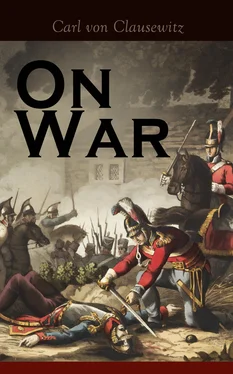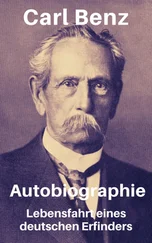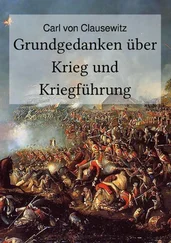An immense space lies between a General—that is, one at the head of a whole War, or of a theatre of War—and his Second in Command, for the simple reason that the latter is in more immediate subordination to a superior authority and supervision, consequently is restricted to a more limited sphere of independent thought. This is why common opinion sees no room for the exercise of high talent except in high places, and looks upon an ordinary capacity as sufficient for all beneath: this is why people are rather inclined to look upon a subordinate General grown grey in the service, and in whom constant discharge of routine duties has produced a decided poverty of mind, as a man of failing intellect, and, with all respect for his bravery, to laugh at his simplicity. It is not our object to gain for these brave men a better lot—that would contribute nothing to their efficiency, and little to their happiness; we only wish to represent things as they are, and to expose the error of believing that a mere bravo without intellect can make himself distinguished in War.
As we consider distinguished talents requisite for those who are to attain distinction, even in inferior positions, it naturally follows that we think highly of those who fill with renown the place of Second in Command of an Army; and their seeming simplicity of character as compared with a polyhistor, with ready men of business, or with councillors of state, must not lead us astray as to the superior nature of their intellectual activity. It happens sometimes that men import the fame gained in an inferior position into a higher one, without in reality deserving it in the new position; and then if they are not much employed, and therefore not much exposed to the risk of showing their weak points, the judgment does not distinguish very exactly what degree of fame is really due to them; and thus such men are often the occasion of too low an estimate being formed of the characteristics required to shine in certain situations.
For each station, from the lowest upwards, to render distinguished services in War, there must be a particular genius. But the title of genius, history and the judgment of posterity only confer, in general, on those minds which have shone in the highest rank, that of Commanders-in-Chief. The reason is that here, in point of fact, the demand on the reasoning and intellectual powers generally is much greater.
To conduct a whole War, or its great acts, which we call campaigns, to a successful termination, there must be an intimate knowledge of State policy in its higher relations. The conduct of the War and the policy of the State here coincide, and the General becomes at the same time the Statesman.
We do not give Charles XII. the name of a great genius, because he could not make the power of his sword subservient to a higher judgment and philosophy—could not attain by it to a glorious object. We do not give that title to Henry IV. (of France), because he did not live long enough to set at rest the relations of different States by his military activity, and to occupy himself in that higher field where noble feelings and a chivalrous disposition have less to do in mastering the enemy than in overcoming internal dissension.
In order that the reader may appreciate all that must be comprehended and judged of correctly at a glance by a General, we refer to the first chapter. We say the General becomes a Statesman, but he must not cease to be the General. He takes into view all the relations of the State on the one hand; on the other, he must know exactly what he can do with the means at his disposal.
As the diversity, and undefined limits, of all the circumstances bring a great number of factors into consideration in War, as the most of these factors can only be estimated according to probability, therefore, if the Chief of an Army does not bring to bear upon them a mind with an intuitive perception of the truth, a confusion of ideas and views must take place, in the midst of which the judgment will become bewildered. In this sense, Buonaparte was right when he said that many of the questions which come before a General for decision would make problems for a mathematical calculation not unworthy of the powers of Newton or Euler.
What is here required from the higher powers of the mind is a sense of unity, and a judgment raised to such a compass as to give the mind an extraordinary faculty of vision which in its range allays and sets aside a thousand dim notions which an ordinary understanding could only bring to light with great effort, and over which it would exhaust itself. But this higher activity of the mind, this glance of genius, would still not become matter of history if the qualities of temperament and character of which we have treated did not give it their support.
Truth alone is but a weak motive of action with men, and hence there is always a great difference between knowing and action, between science and art. The man receives the strongest impulse to action through the feelings, and the most powerful succour, if we may use the expression, through those faculties of heart and mind which we have considered under the terms of resolution, firmness, perseverance, and force of character.
If, however, this elevated condition of heart and mind in the General did not manifest itself in the general effects resulting from it, and could only be accepted on trust and faith, then it would rarely become matter of history.
All that becomes known of the course of events in War is usually very simple, and has a great sameness in appearance; no one on the mere relation of such events perceives the difficulties connected with them which had to be overcome. It is only now and again, in the memoirs of Generals or of those in their confidence, or by reason of some special historical inquiry directed to a particular circumstance, that a portion of the many threads composing the whole web is brought to light. The reflections, mental doubts, and conflicts which precede the execution of great acts are purposely concealed because they affect political interests, or the recollection of them is accidentally lost because they have been looked upon as mere scaffolding which had to be removed on the completion of the building.
If, now, in conclusion, without venturing upon a closer definition of the higher powers of the soul, we should admit a distinction in the intelligent faculties themselves according to the common ideas established by language, and ask ourselves what kind of mind comes closest to military genius, then a look at the subject as well as at experience will tell us that searching rather than inventive minds, comprehensive minds rather than such as have a special bent, cool rather than fiery heads, are those to which in time of War we should prefer to trust the welfare of our women and children, the honour and the safety of our fatherland.
CHAPTER IV.
Of Danger in War
Table of Contents
Usually before we have learnt what danger really is, we form an idea of it which is rather attractive than repulsive. In the intoxication of enthusiasm, to fall upon the enemy at the charge—who cares then about bullets and men falling? To throw oneself, blinded by excitement for a moment, against cold death, uncertain whether we or another shall escape him, and all this close to the golden gate of victory, close to the rich fruit which ambition thirsts for—can this be difficult? It will not be difficult, and still less will it appear so. But such moments, which, however, are not the work of a single pulse-beat, as is supposed, but rather like doctors’ draughts, must be taken diluted and spoilt by mixture with time—such moments, we say, are but few.
Let us accompany the novice to the battle-field. As we approach, the thunder of the cannon becoming plainer and plainer is soon followed by the howling of shot, which attracts the attention of the inexperienced. Balls begin to strike the ground close to us, before and behind. We hasten to the hill where stands the General and his numerous Staff. Here the close striking of the cannon balls and the bursting of shells is so frequent that the seriousness of life makes itself visible through the youthful picture of imagination. Suddenly some one known to us falls—a shell strikes amongst the crowd and causes some involuntary movements—we begin to feel that we are no longer perfectly at ease and collected; even the bravest is at least to some degree confused. Now, a step farther into the battle which is raging before us like a scene in a theatre, we get to the nearest General of Division; here ball follows ball, and the noise of our own guns increases the confusion. From the General of Division to the Brigadier. He, a man of acknowledged bravery, keeps carefully behind a rising ground, a house, or a tree—a sure sign of increasing danger. Grape rattles on the roofs of the houses and in the fields; cannon balls howl over us, and plough the air in all directions, and soon there is a frequent whistling of musket balls. A step farther towards the troops, to that sturdy infantry which for hours has maintained its firmness under this heavy fire; here the air is filled with the hissing of balls which announce their proximity by a short sharp noise as they pass within an inch of the ear, the head, or the breast.
Читать дальше












